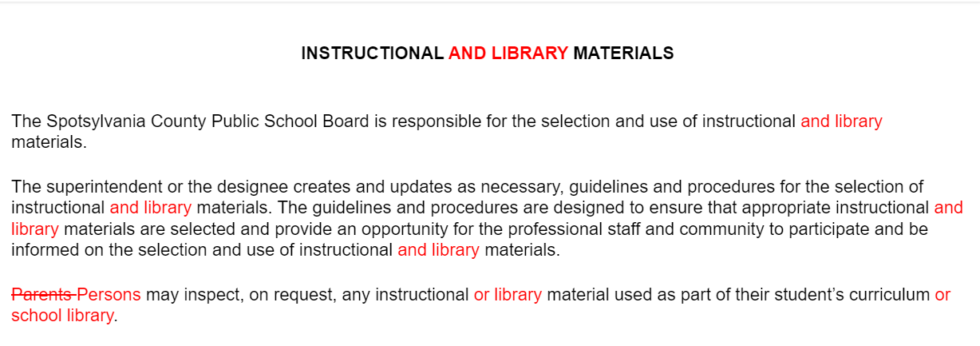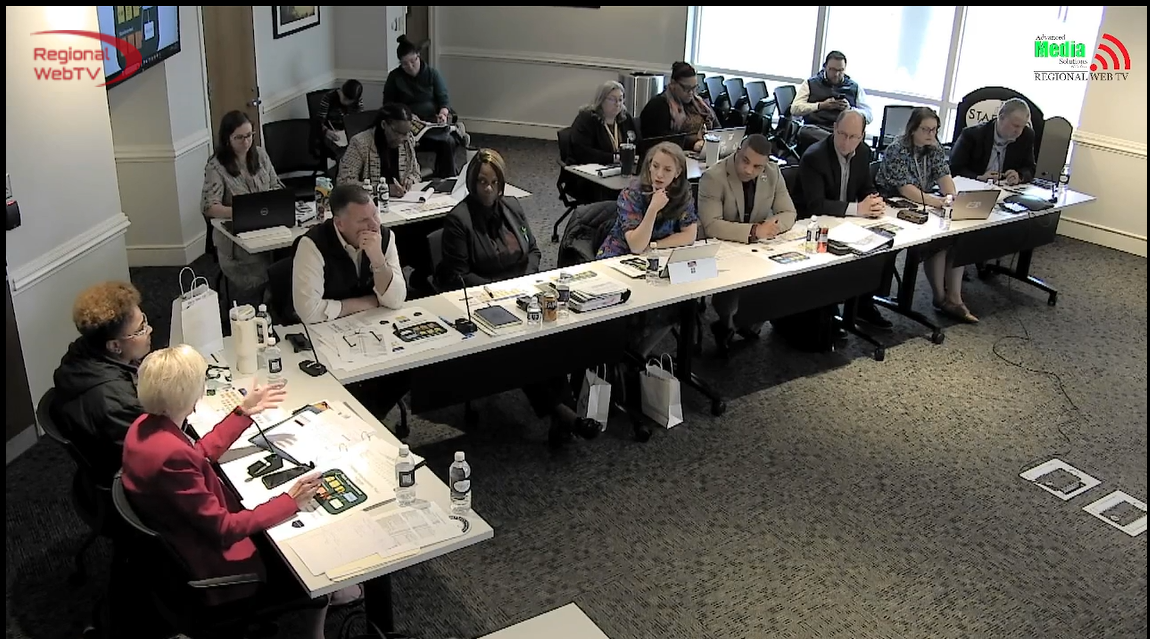
Library materials now fall under the Spotsylvania School Board’s policy that governs the selection and review of instructional materials, and library books can be removed if they are found to have sexually explicit content as defined by Virginia Code.
The School Board on Monday approved changes to Policy IIA and its accompanying regulations. The changes were authored by outgoing Board member Rabih Abuismail and were brought forward and approved without the Board being given time to review the changes beforehand.
Consideration of the changes was not on the agenda for Monday’s meeting, and the proposed revisions were not made available to the public in advance.
The Path to Calling Library Books ‘Instructional Materials’
Virginia Code section 22.1-16.8, enacted last year, required the Virginia Department of Education to develop model policies ensuring parental notification of instructional (our emphasis) material with sexually explicit content and required that local school boards adopt policies consistent with—or more comprehensive than—those policies.
The VDOE’s model policies—and the policy first adopted by the Spotsylvania School Board in December of last year—state that library materials only count as instructional materials “when used (i) for completion of an assignment, or (ii) as part of an academic or extracurricular educational program.”
The revised policy IIA and accompanying regulations approved Monday—which Abuismail said he wrote after consulting with “some community members” and which the Advance received on Wednesday from the school division—add the words “and library materials” after every instance of the phrase “instructional materials.”
It now states that schools are responsible for identifying instructional and library materials with sexually explicit content and for notifying parents.
“If librarians come across library materials containing sexually explicit content while reviewing their collections, then they are to mark it in Destiny (the online catalogue) and have it available only to students whose parents have not opted their children out of accessing sexually explicit materials,” the revised policy states.
Opening Pandora’s Box on Reviews
The regulations accompanying the policy lay out the process for reconsideration of instructional—and now library—materials. They seem to allow anyone wishing to challenge a library book to initiate the complaint directly with the school librarian:
“It is the complainant’s responsibility to arrange a conference with the principal and, in the cases of library material, a school librarian/media specialist.”
Abuismail’s changes to the regulations remove the requirement that the principal, school librarian or ad hoc review committee read the challenged material in full before making a decision on whether it should remain. Instead, the regulations now state that the materials should be reviewed in their entirety “when practical.”
The principal or school librarian then makes a decision about the book and notifies the complainant, the superintendent and the head librarian, according to the new regulation.
Abuismail has added the following sentence to this part of the regulation: “In cases of removal from the individual school, the head librarian, superintendent, or superintendent’s designee may also choose to apply this decision division-wide.”
The complainant is able to appeal the principal’s or school librarian’s decision, and the School Board is responsible for rendering a final decision. Abuismail has added a sentence clarifying how the School Board should review the material: “This is to be done in an open meeting following a rotating, ad hoc committee of three board members reading the book in its entirety within twenty-one working days.”
Over the summer, an ad hoc, four-member committee met four times to review and suggest changes to the materials policy and its regulations. The School Board considered the committee’s proposed revisions at its meeting in November and did not approve them at that time.
The version approved this week incorporates some of those changes but leaves out others. One change that Abuismail’s version leaves out is the suggestion of limiting the number of challenges a school will consider at one time, to avoid overwhelming staff.
A committee addition that remains part of the policy as approved is a section describing how parents or guardians can indicate whether or not their student can have access to “sexually explicit” content.
It reads: “Schools shall defer to parents to determine whether the use of sexually explicit content in instructional materials, if any, is appropriate for their child. This will be done through an opt-out questionnaire on Parentvue (the division’s student information database) or in writing. Refusal to fill out the Parentvue questionnaire or submit opt-out in writing will be considered consent to access sexually explicit material.”
by Adele Uphaus
MANAGING EDITOR AND CORRESPONDENT





